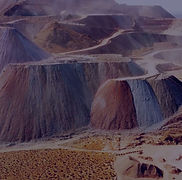
The global tailings challenge
Across the globe, billions of tonnes of mine tailings sit in storage dams and waste piles — a silent, growing crisis. For mining companies and governments, these materials are not simply by-products; they are long-term liabilities that carry environmental, regulatory, and financial risk. Tailings dams require constant monitoring and maintenance, yet continue to pose a threat to communities, ecosystems, and water tables. The costs of compliance, clean-up, and potential failure stretch far beyond financial balance sheets — they impact reputation, safety, and social licence to operate.
Traditional tailings management has locked the sector into a perpetual cycle of risk and expense. Ongoing supervision, heavy maintenance, and the constant threat of leaks or dam failures burden miners and governments alike. Around the world, communities, regulators, and investors are demanding a safer, sustainable solution.
We transform,
tailings into agri-treasure
FutureSmart Remediating delivers that solution. In partnership with Advanced Materials Processing Inc. (AMPI), it turns mining’s greatest environmental challenge into a circular-economy opportunity. Through a cost-effective, turnkey process, tailings are stabilised, neutralised, and repurposed into BioRoc™ — a 100% natural bio-mineral fertiliser that revitalises soil, supports agriculture, and fuels a cleaner future.
This patented AMPI process removes or stabilises toxic elements, binding them into harmless compounds and transforming the remaining material into something of enduring value. What was once an environmental liability becomes a productive input that supports farming, food security, and local economies.
Independent proof-of-concept testing has already confirmed success — gold and copper tailings have been fully converted into safe, nutrient-rich fertiliser. For governments and mining companies, the waste problem isn’t simply reduced — it’s eliminated, permanently.
From waste
to resource

A win for Governments
For governments, tailings are often a national legacy challenge — vast storage sites, abandoned mines, and billions in unfunded clean-up costs. Left unmanaged, they threaten communities, ecosystems, and water tables.
FutureSmart Remediating offers a way forward. Tailings are processed through a proven process eliminating long-term liabilities, rehabilitating tailings dams for safer use, and reducing environmental risk for surrounding communities. Governments avoid the significant expense of long-term monitoring while demonstrating decisive clean-up action on legacy mining issues.
And because the accepted tailings are repurposed into FutureSmart Agriculture's BioRoc™ natural bio-fertiliser, governments also benefit from a powerful downstream solution. Local factories are built to process tailings and other waste streams, creating jobs, regional economic value and generating surplus green energy. The end product supports healthier agriculture and communities, reduces reliance on chemical fertilisers and pesticides to protects waterways and lower CO₂ emissions. With stronger, more resilient farming systems, governments can enhance food quality, population health, food security, showcase environmental leadership, and turn mining’s past liabilities into strategic national assets.
A win for Miners
For miners, tailings are a costly burden — requiring ongoing TSF monitoring, maintenance, and financial bonds, all while carrying environmental, compliance, and reputation risk. Left unresolved, they weigh down operations, profit, and social licence to operate.
FutureSmart Remediating offers closure and peace of mind. Tailings are processed across the life of the mine, reducing maintenance obligations and eliminating long-term liabilities. TSF operations are de-risked, compliance targets are more easily met, and communities see tangible progress in land rehabilitation and environmental risk management. The result is a cleaner site and a stronger social licence to operate.
And because the accepted tailings are repurposed into FutureSmart Agriculture's BioRoc™ natural bio-fertiliser, miners also play a role in creating circular economic value. Local factories are established to process tailings alongside food and forestry waste, generating regional jobs and industry activity. The end product delivers wide-reaching benefits — healthier soils, more resilient crops, higher crop yields, reduced water use, lower greenhouse gas emissions, and nutrient-rich food that strengthens human health. Mining tailing's legacy is no longer a liability but an asset that is a foundation for agricultural renewal, community wellbeing, and environmental recovery.
From liability to legacy
Through FutureSmart Remediating, mine tailings are no longer a burden to be contained but a resource to be renewed. Once processed, they are transformed into safe, stable, and valuable materials that feed directly into the next stage — FutureSmart Agriculture.
Here, these revitalised materials become the foundation of BioRoc™, a natural bio-mineral fertiliser that rebuilds soils, strengthens crops, and restores fertility to farming land. What began as a costly liability now drives agricultural regeneration, food security, and climate resilience.
For mining companies and governments, the outcome is profound: environmental risk is replaced with measurable value — leaving behind a cleaner, safer, and more trusted legacy that supports both people and planet.

Either lead,
follow or get out of the way...
Dennis Amoroso
In this inspiring podcast, Dennis Amoroso, President of AMPI, shares the story of how mine tailings and food waste can be transformed into BioRoc™ — a natural, carbon-sinking, low cost fertiliser that restores soils, boosts crop yields, and eliminates the water system damage caused by chemical fertilisers.
This story was originally featured on the Pathway to Peak Performance Podcast. We are grateful for Jock Putney's permission to share it here.

How it works

Collection
Onirik's partner AMPI receives your current or historical tailings waste once transported to one of their proprietary processing facility.
Repurpose
Pre-processing:
-
Mine tailings are processed and unwanted elements are selectively removed with non-toxic chemicals.
Fertiliser production:
-
Mine waste is combined with a blend of all-natural products for superior performance.
-
The mixture undergoes anaerobic digestion (oxygen-free environment).
-
This process creates solid and liquid all-natural fertilisers as well as methane gas (this gas can be used for electricity or heat generation).
Rewards
-
You gain a risk-managed, turnkey solution for tailings remediation.
-
You transform a costly liability into a clean slate.
-
Together, we help create a positive impact on mining sustainability, communities, the circular economy, food security, and ecosystems.










